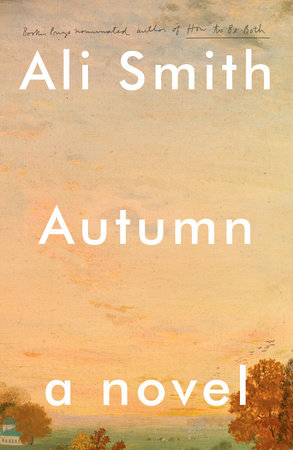Autumn
by Ali Smith
reviewed by Jackie Thomas-Kennedy
Ali Smith’s latest novel, Autumn, does not trouble itself with plot mechanics, nor with the creation and maintenance of suspense. This is a confident, witty plunge into the matter of language: the privilege of knowing and using it, the pitfalls of its misuse, its role in the creation of image, identity, memory. Language both comprises the work and is its central subject; language fuels the humor (Smith rarely shies from a pun) and, on occasion, thickens and slows the narrative to a standstill. One might place Smith in the company of Vladimir Nabokov and Lorrie Moore, among others, for the awe she offers the written word.
Her central characters are no less reverent. “Elisabeth Demand—thirty two years old, no-fixed-hours casual contract junior lecturer at a university in London,” sits at the bedside of Daniel Gluck—a man of indeterminate but pointedly advanced age—while he endures “an increased sleep period” under the gaze of care assistants who say things like “[h]e’s had a good innings”. Though Elisabeth isn’t next of kin—Daniel was her next-door-neighbor when she was a child—she lies, claiming next-of-kin status, and watches Daniel sleep while she holds a copy of Brave New World.
Though Elisabeth’s perspective is dominant here, Smith takes an occasional glance into Daniel’s mind while he slumbers. His dreams feature a hyperawareness of language, an allusive and mimetic quality, almost as if they are found poetry. Take, for instance, the novel’s opening lines: “It was the worst of times, it was the worst of times. Again. That’s the thing about things. They fall apart”. Daniel is well-read and well-connected to the art world; an “[o]ld queen,” “frail,” with a house full of “arty art,” according to Elisabeth’s mother; and the first person in Elisabeth’s life, it seems, to recognize just how precocious she is. Elisabeth’s mother seems far less taken with her daughter’s intelligence than “Mr. Gluck,” who nourishes, emboldens, and adores it.
Smith records many of their conversations—Daniel the teacher, Elisabeth the eager, if acerbic, young student. “Always be reading something,” he advises her. And later, “The word gymkhana … is a wonderful word, a word grown from several languages.” Thus follows a conversation that encapsulates much of the novel’s concern:
Words don’t get grown, Elisabeth said.
Words are themselves organisms, Daniel said.
Oregano-isms, Elisabeth said.
Herbal and verbal, Daniel said. Language is like poppies. It just takes something to churn the earth round them up, and when it does up come the sleeping words, bright red, fresh, blowing about. Then the seedheads rattle, the seeds fall out. Then there’s even more language waiting to come up.
Daniel Gluck’s spell takes hold. Elisabeth is always reading (see Brave New World at his bedside, and later, A Tale of Two Cities). Daniel teaches her to picture visual art based on his descriptions; later, we see Elisabeth studying pop artist Pauline Boty, one of whose subjects, Christine Keeler, surfaces in Daniel’s dreams. This is another chord in the song of Daniel and Elisabeth’s intellectual connection. Though they are—as with every sentence of Smith’s—impeccably written, the Pauline Boty/Christine Keeler pages amount mostly to the sense that a great amount of research has been undertaken.
Research is part of Elisabeth’s academic life; furthermore, and perhaps more consequentially, it’s a part of knowing Daniel Gluck. By thirty-two, Elisabeth finds herself recognizing how little she knew of her neighbor. His age is a recurring question; in 1998, when Elisabeth is thirteen, her mother claims he is “eighty-five.” She knows little about his origins; her mother suggests he may not speak English well, and Elisabeth retorts that he isn’t “foreign.” The novel examines questions of identity as they are answered through actual pieces of identification.
Elisabeth, claiming to be Daniel’s next of kin, presents an expired document that would not be helpful in any capacity, expired or otherwise, because she is lying, though the document speaks the truth. There is the suggestion that Elisabeth is, in fact, Daniel’s granddaughter, simply because she is keeping vigil at his bedside; or perhaps because when he finally wakes and asks for his “granddaughter,” Elisabeth is the one who appears, to his satisfaction. There is Smith’s wonderful decision to leave them in the care providers’ home, reuniting casually, as if they both knew they would. There is the suggestion that language, for all its poppy-red vibrancy, has moments of uselessness.
Published on October 3, 2017

